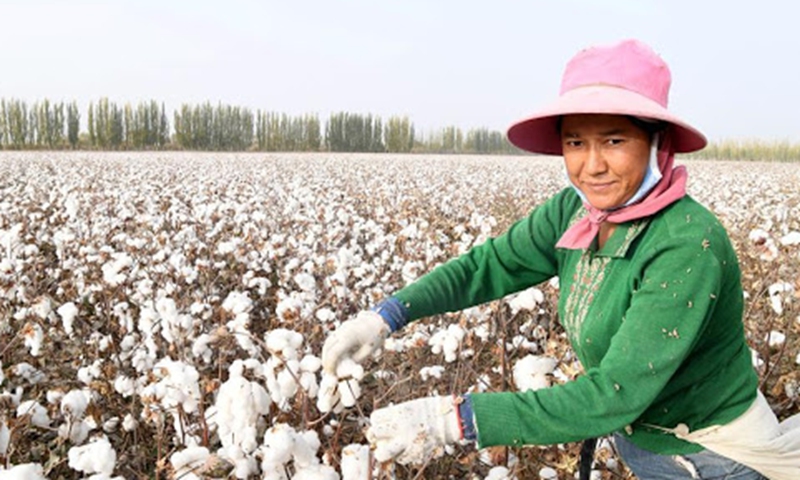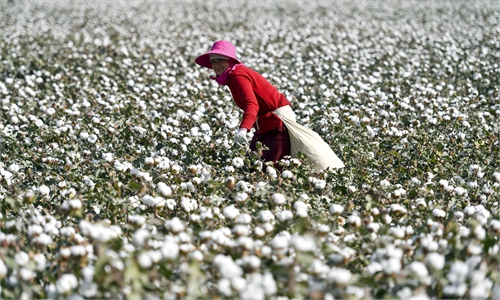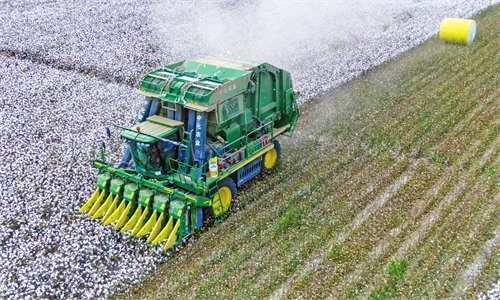China seeks to replace weakening global cotton industry body BCI
Chinese cotton industry seeks to replace BCI

Xinjiang Cotton
Chinese cotton industry is moving ahead with plans to form a fairer and more transparent international industry standard-setting platform to replace the Better Cotton Initiative (BCI), a Switzerland-based nongovernmental organization, as the latter failed to facilitate the positive and sound development of the global cotton supply chain, Chinese industry experts said on Sunday.
The BCI, which had been the leader in the global cotton industry, has been under heavy fire both in China and abroad for its baseless "force labor" claims against cotton from Northwest China's Xinjiang Uygur Autonomous Region and is losing membership and leadership in the global industry.
In the latest development, US brand Levi Strauss was standing down from the BCI's leadership amid debate over the group's response to "alleged human rights abuses" in Xinjiang's cotton industry, the Wall Street Journal reported on Friday, citing people familiar with the matter.
There has been no more information about Levi's on the board of directors on the BCI's website on Sunday. Both Levi's and the BCI could not be reached for comment as of press time.
The US firm's reported move came after the BCI and H&M sparked widespread anger in China over their baseless claims against Xinjiang cotton. Meanwhile, several other large international fashion brands, including FILA and MUJI, expressed their strong support for Xinjiang cotton in defiance of BCI's claim.
Chinese industry experts said Levi's move is in line with expectation since the BCI's illusion over Xinjiang cotton not only damaged its own industry reputation but also bring about risks of uncertainty to the global textile supply chain, in which Xinjiang cotton holds a significant share.
The weakened BCI has created an opportunity for the Chinese industry to establish a new coalition for quality evaluation, according to experts.
Wang Wenkui, an executive at the China Cotton Industry Alliance (CCIA), an organization under the Institute of Cotton Research of Chinese Academy of Agricultural Sciences, told the Global Times on Sunday that the domestic industry has already been doing the ground work for a new coalition and that some of CCIA's experts have also been invited to formulate Chinese cotton standards.
"The standards of BCI are too general and may not suitable for cotton grow in China," said Wang, noting that the Chinese cotton standards will offer detailed cotton growing practices, including growing temperature and regulation of pesticides.
"China's related organizations and departments have now started the integration of scattered cotton growers to form a sophisticated industry," said Wang, noting that China's cotton growing industry is formed mainly by individual farming units, which makes it relatively difficult to adopt a unified standard.
China is now the world's largest cotton consumer and the second-largest cotton producer, with total demand of about 8 million tons per year, accounting for about one third of the global total consumption, data shows.
Supported by world-leading technologies and management, China also supplies
more than 80 percent of high-grade yarns and grey fabrics for the global textile supply chain.
Given China's large cotton consumption market and production scale, China's cotton standards are likely to become new global cotton standards, one expert said.
"I'm quite confident that our cotton growing standards will replace the BCI standards in future," said Wang.



